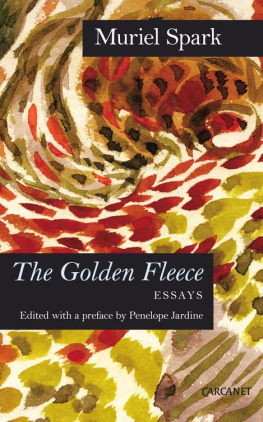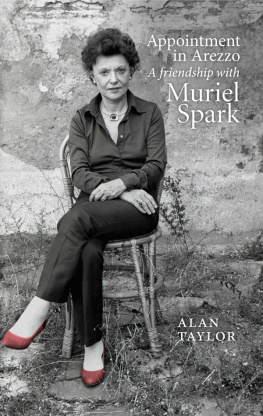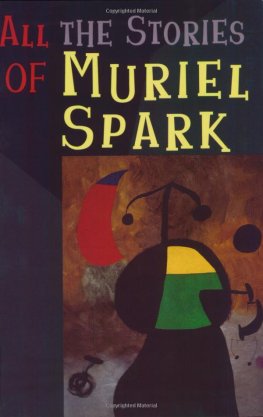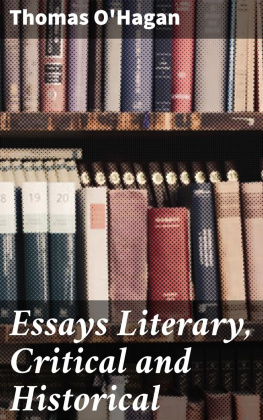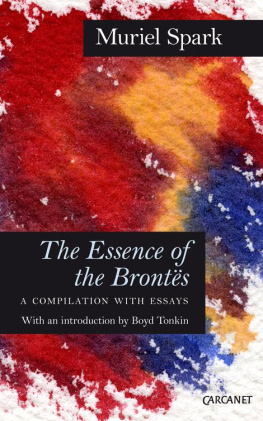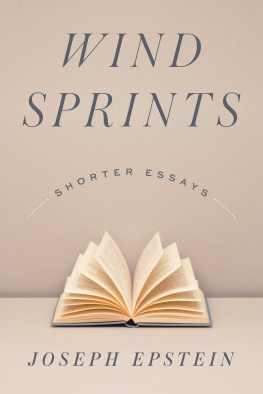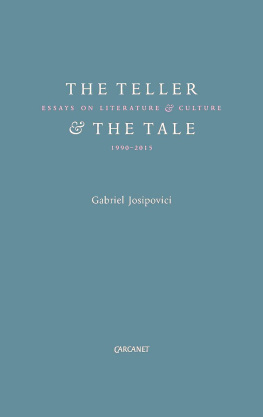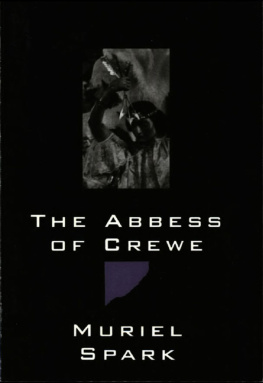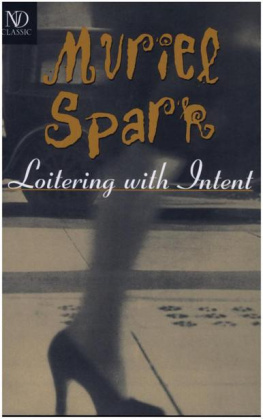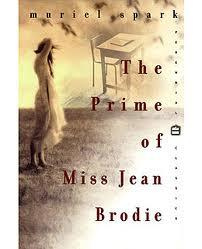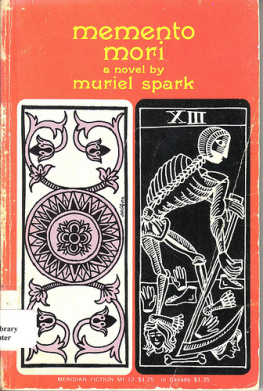Spark Muriel - The Golden Fleece: Essays
Here you can read online Spark Muriel - The Golden Fleece: Essays full text of the book (entire story) in english for free. Download pdf and epub, get meaning, cover and reviews about this ebook. year: 2014, publisher: Carcanet, genre: Non-fiction. Description of the work, (preface) as well as reviews are available. Best literature library LitArk.com created for fans of good reading and offers a wide selection of genres:
Romance novel
Science fiction
Adventure
Detective
Science
History
Home and family
Prose
Art
Politics
Computer
Non-fiction
Religion
Business
Children
Humor
Choose a favorite category and find really read worthwhile books. Enjoy immersion in the world of imagination, feel the emotions of the characters or learn something new for yourself, make an fascinating discovery.
- Book:The Golden Fleece: Essays
- Author:
- Publisher:Carcanet
- Genre:
- Year:2014
- Rating:5 / 5
- Favourites:Add to favourites
- Your mark:
- 100
- 1
- 2
- 3
- 4
- 5
The Golden Fleece: Essays: summary, description and annotation
We offer to read an annotation, description, summary or preface (depends on what the author of the book "The Golden Fleece: Essays" wrote himself). If you haven't found the necessary information about the book — write in the comments, we will try to find it.
The Golden Fleece: Essays — read online for free the complete book (whole text) full work
Below is the text of the book, divided by pages. System saving the place of the last page read, allows you to conveniently read the book "The Golden Fleece: Essays" online for free, without having to search again every time where you left off. Put a bookmark, and you can go to the page where you finished reading at any time.
Font size:
Interval:
Bookmark:
Good literary essays, in particular, have sustaining and stimulating qualities, like deep wells and clear rivers.
Muriel Spark asked me to collect her essays, reviews, journalism, interviews, broadcasts, speeches, opinions in other words, her prose writing and make a selection for publication, while helping her with her other work: that is to say, keeping an eye on her books with publishers all over the world, business correspondence, card indexes and filing. (Her archive is extensive and mainly to be found in the National Library of Scotland, Edinburgh, and the McFarlin Library at the University of Tulsa.)
In the long-ago summer of 1991 Muriel rented a house for the month of July on the German island of Sylt in the North Sea, off Denmark. We drove up to North Schleswig and put the car on a double-decker open train, which raced out to the island on a causeway from Niebll. Sylt is a popular holiday island, long and thin, with one side exposed to the elements with sand-dunes and cliffs; the other, landward side, faces a shallow inland water with a ribbon of sand inhabited by wading birds. Here, in Kampen, I spread out a lifetime of Muriels essays and reviews.
Little did I know then how many years were to pass before I would have sorted these down to a selection for this volume. Soon after this almost idyllic holiday, Muriel decided she must have a hip operation and that was the beginning of years of pain for her, operations to put things right which didnt, and which took up all her days and nights and energy. What she did achieve in those following years was quite astonishing. She published her own volume of autobiography, Curriculum Vitae, in 1992 and, despite being in and out of hospital until 1995, she continued to publish and write. In 1996 she published a new novel, Reality and Dreams. She was to publish two more novels (Aiding and Abetting and The Finishing School) before she died in 2006.
Those latter years were, unfortunately, not as peaceful as they should have been: family problems and an unauthorised biography took away a lot of joy and undermined her courage. Her sense of adventure was not diminished, however, and we set off for long journeys by car to Spain, to Portugal, to Berlin, for congresses, British Council events and literary festivals.
In a 2003 interview, when she had just finished her last novel, Muriel said that she was going to concentrate on another volume of memoirs. She made notes and yes, she meant this then, but in fact her next book was to have been another novel, Destiny. I think she really was not inspired enough to write about herself and all the difficulties as well as all the joys of her life. She knew them all, they were past, they no longer interested her. Besides, she felt, as Graham Greene did, that as you went on your autobiography involved too many other living people. She really wanted to get on with the excitements of creation and the idea for a new novel nearly always crept into her dreams and devoured her attention.
Journalists demand to know What is your favourite book?, Who is your favourite author?, What book would you like to have written?, Which writer do you admire most?, Who has influenced your writing? and so on. By nature, a writers journalism must contain a certain amount of autobiography. Some of Muriel Sparks answers provided here to such questions reveal, I think, huge areas of her experience and idiosyncrasies, which are not to be found in essays on Cardinal Newman or reviews of C. Day Lewiss poems. I hope that some of the short pieces and penses in this volume will therefore, in some measure, fill the gap of Muriels unwritten memoirs.
So, after many interruptions, I sorted these prose pieces down to a selection of her thoughts on art and poetry, her autobiographical pieces and travel, her writings on literature and finally some mixed religious, political and philosophical essays and reviews. The outcome is a book which, I believe, tells many things, mainly about the author Muriel Spark, and I hope throws light on how she felt when young, in tune with the solitary sadness of the Bronts; how she was inspired as a writer and became a Roman Catholic from reading Cardinal Newman; how amused she was by some of the curiosities that came her way to review, such as Our Dearest Emma, the crazy Abbot Aelred (who is not included here) and the fashionable tattooist Professor Burchardt; her empathy with Mary Shelley waiting for Shelleys boat to return to San Terenzo and her later struggle in London to support her son, Percy, so like Muriels own hard times, as, virtually, a widow or a single mother she fought to support her own son.
I would like to say here that the essay, often quoted by scholars, entitled My Conversion, published in Twentieth Century, CLXX, autumn 1961, was not an essay of Muriel Sparks but an interview she gave to a priest, who wrote his own version of what she said in reply to his questions. They were not her own expressions: it was his essay, and it was his title. In fact she had nothing to convert from. She embraced Christianity of her own free choice, first Anglicanism and then Roman Catholicism. Her family were mixed Jewish and Protestant and they didnt object. Her father rarely went to the synagogue because, as a working man, he was working on the Sabbath. Her mother seems to have hedged her bets and had menorah, crosses and Buddhas, as well as a statue of the Venus de Milo for good measure. For them, what was good for Muriel was good.
I am struck, on reading the many essays and reviews of half a century ago, by the extent to which God and religion have now gone out of our daily lives. In the 1950s and 1960s it was natural that in any article, book or radio talk on the arts, literature, music, painting, and also science, these subjects would almost always be viewed or reviewed in relation to our inner spiritual values, with references to God, some deity at least, and religion in general.
I found that most of the pieces I selected fell into some sort of category, such as Art or History or Travel. Inevitably, there is a preponderance of writing which could be defined as Literature: essays on other writers, reviews of books, opinions on the classics. Muriel reviewed weekly for the London Observer for approximately ten years; consequently there are many short commentaries on books of the time with interesting titles that have entered the language, such as Not Waving but Drowning or The Loneliness of the Long-distance Runner. It was tempting to include these here for their charm, like credits in early films which introduce Shirley Temple, Marilyn Monroe or James Dean. But they didnt in the end quite merit selection.
I have begun this book with the essay titled The Golden Fleece, since it was one of Muriels earliest essays, published in 1948. The story of this ancient Greek myth must have appealed to Muriels early passion for the savagery of the Border Ballads and as a story it lacks none of the many dramas of life: love, adventure, adversity, betrayal, success, triumph, cruelty and loss. It is all there.
For the sake of avoiding repetition, I have had to omit a paragraph or two in some of the pieces, indicated by ellipses. Very occasionally I have added a missing word, indicating this with square brackets. In the case of certain essays where history has altered the truth of some statements, I have left the original text and provided footnotes. Some of the early essays probably do not incorporate recent scholarship, but I have included them for what they say historically.
Titles have been chosen according to my instinct. Muriel Sparks own titles for her pieces were frequently changed by newspaper editors. Sometimes Muriels original title has prevailed, but not always, since the newspapers published title can be more appropriate. Occasionally I have given a simplified version in preference to either, such as just Venice for Venice out of Season or Venice in Fall and Winter. Even Venice has changed since those far-off days of 1981: every season is in season and you may no longer visit Venice without tourists.
Font size:
Interval:
Bookmark:
Similar books «The Golden Fleece: Essays»
Look at similar books to The Golden Fleece: Essays. We have selected literature similar in name and meaning in the hope of providing readers with more options to find new, interesting, not yet read works.
Discussion, reviews of the book The Golden Fleece: Essays and just readers' own opinions. Leave your comments, write what you think about the work, its meaning or the main characters. Specify what exactly you liked and what you didn't like, and why you think so.

